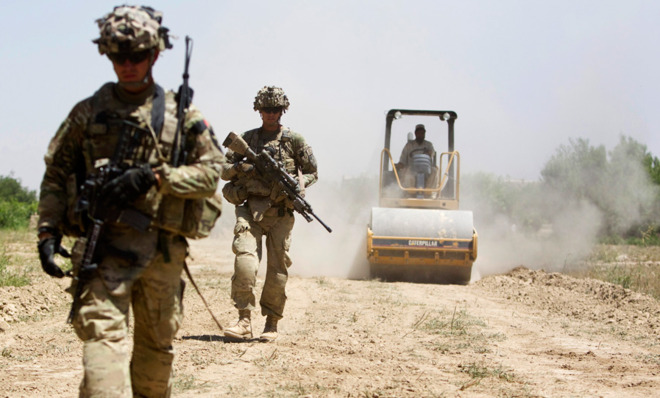The shocking cost of reconstructing Afghanistan
With the eyes of the world on Syria, let's not forget about that other war-torn country

A free daily email with the biggest news stories of the day – and the best features from TheWeek.com
You are now subscribed
Your newsletter sign-up was successful

While the eyes of the world are on Syria and President Obama's plans to defeat ISIS, the chief auditor in charge of overseeing the U.S. reconstruction efforts in Afghanistan has a warning to policy makers: Don't forget about the other war-torn country that has already cost hundreds of billions of dollars and has serious problems with corruption and sustainability.
So far, the United States has poured more than $104 billion into Afghanistan reconstruction efforts — that's more than all the money spent on reconstructing Europe after World War II. Much of that money, as auditors have noted, has been lost to waste, fraud, and abuse. In 2010, SIGAR accountants told The Fiscal Times they could only account for less than 10 percent of that money.
That's a shocking sum, especially since Congress has already authorized another $16 billion to spend in Afghanistan in the next few years. Still, despite spending an "unprecedented" amount of money to rebuild this country, it has no strategy to weed out corruption — leaving hundreds of billions of tax dollars vulnerable, John Sopko, the Special Inspector General for Afghanistan Reconstruction (SIGAR) told an audience at Georgetown University.
The Week
Escape your echo chamber. Get the facts behind the news, plus analysis from multiple perspectives.

Sign up for The Week's Free Newsletters
From our morning news briefing to a weekly Good News Newsletter, get the best of The Week delivered directly to your inbox.
From our morning news briefing to a weekly Good News Newsletter, get the best of The Week delivered directly to your inbox.
"This is astonishing, given that Afghanistan is one of the most corrupt countries in the world and a country that the United States is spending billions of dollars in," the auditor said. He added that "things could get worse with the drawdown" that is scheduled for the end of 2015.
It's not just corruption that threatens to derail all of the gains the U.S. has made in the country. Afghanistan, as Sopko noted, has a major problem with sustainability.
Right now, the United States and other international donors fund more than 60 percent of Afghanistan's national budget of around $7.6 billion. Last year, for example, the Afghan government raised $2 billion in revenues; the rest came from foreign aid, mostly from the United States.
Sopko says in the next few years, the Afghan National Security Forces are going to require a force of 374,000 — at a cost of roughly $5 billion a year. "At these levels, if the Afghan government were to dedicate all of its domestic revenue toward sustaining the Afghan army and police, it still could only pay for about a third of the cost. Moreover, all other costs from paying civil servants to maintaining all roads, schools, hospitals, and other non-military infrastructure would also have to come from international donors," Sopko said. "The bottom line is, it appears we've created a government that the Afghans simply cannot afford."
A free daily email with the biggest news stories of the day – and the best features from TheWeek.com
Sopko is known for being extremely critical of the government agencies involved in reconstruction efforts. He told the audience that the U.S. government has failed to address Afghanistan's corruption and sustainability issues — which threaten to "jeopardize every gain" the U.S. has made. Meanwhile, he said the government's counter-narcotics effort has also been a failure and if unaddressed could completely derail any progress the U.S. has made.
"The U.S. has already spent nearly $7.6 billion to combat the opium industry. Yet, by every conceivable metric, we've failed," Sopko said.
Sopko and his team frequently churn out scathing reports highlighting the failures of the Defense and the State Departments in Afghanistan — and many of them receive a wide swath of media attention. This has unsurprisingly sparked some tension between the auditors and officials from the departments being audited who routinely have problems with the IG's findings. They say that responding to IG reports "chews up countless hours, and that the inspector general's work ultimately undermines the effort to build stronger civilian institutions here by creating the impression that the United States is simply pouring money down the well," The New York Times reported.
Sopko says, "SIGAR welcomes publicity because publicity gives our reports and work impact in this town and in Kabul and around the world." He added, "I admit, some ambassadors and generals and nameless, faceless bureaucrats and contractors are unhappy with the fact we get press coverage, even though our two-person press shop pales in comparison to the squadrons of PR people at Embassy Kabul, ISAF, or the Pentagon. But that is the cost of transparency and open government."
More from The Fiscal Times...
-
 The environmental cost of GLP-1s
The environmental cost of GLP-1sThe explainer Producing the drugs is a dirty process
-
 Greenland’s capital becomes ground zero for the country’s diplomatic straits
Greenland’s capital becomes ground zero for the country’s diplomatic straitsIN THE SPOTLIGHT A flurry of new consular activity in Nuuk shows how important Greenland has become to Europeans’ anxiety about American imperialism
-
 ‘This is something that happens all too often’
‘This is something that happens all too often’Instant Opinion Opinion, comment and editorials of the day